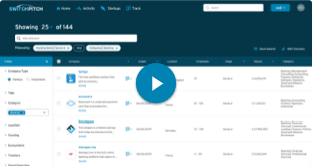

Relationship management tools are moving towards specialization – beyond customer relationships to a variety of specialized relationships. Procurement, HR, Innovation, Compliance and more have their own systems of record. While customer relationship management platforms (CRM) provide a general tool for contact centralization, many corporate functions have unique dynamics requiring specialized tools.
What does this mean for innovation teams? As we covered in our recent blog post, Chief Innovation Officers are the new Chief Marketing Officers. CIOs and their innovation teams have a new crop of tools catering to their specific needs.
For startup ecosystem tracking, Startup Relationship Management platforms (SRM) are addressing specific characteristics of corporate + startup relationships. Unique functions include keeping tabs on the ever-expanding startup universe with constantly-changing data; and two-sided marketplace interactions. This blog post compares how CRM and SRM tools stack up for startup ecosystem tracking.
CRMs
Ask any colleague if they enjoy using your company’s CRM. With near-certainty, the answer is no. You’ve heard the complaints: user interface is dated; adding information is too time-consuming; everyone uses their own tracking system; data quality is poor..and on and on.
CRM tools launched in the 1980s – starting with ACT!, then Siebel Systems – and shifted towards cloud platforms in the early 2000s. CRM usage became standard practice due to email proliferation and need for customer communication tracking.
Like Microsoft Office, CRM tools are generalist tools – not specialty tools. Lowest common denominators define generalist tools. For CRMs, these denominators include:
- Known universe: Customers are known entities, inputted by the CRM owner
- One-sided: Customers cannot contribute information to your CRM
- Cloud-hosted: Customer data sits on cloud servers, not local networks
In most enterprise relationship management dynamics, the above attributes work just fine – no issues. However, for specialized instances like startups / innovation tracking, CRMs are inadequate.
SRMs
Innovation teams frequently scout, analyze and manage startup relationships. For startup relationship management, the dynamics are completely different than traditional customer relationships. Startup ecosystem tracking is defined by:
- Expanding universe: Startups launch daily and must be tracked prior to a relationship
- Two-sided: Lots of back and forth data to determine corporate + startup fits and enable proof-concept tracking
- Bifurcated data security: Startup profiles need to be cloud-hosted – available to all. Enterprise analysis / notes must be secure and local – this information may move markets!
Re-imaging a tool with these characteristics takes a new start – not something that begins with an old framework.
SwitchPitch started with a simple premise: focus on the needs of corporate scouts to make scouting more efficient and effective. Rather than fulfilling many corporate relationship needs – we focus exclusively on startup relationship management – a term we coined!
SRMs like SwitchPitch facilitate relationships by enabling startups to create profiles with work history – similar to LinkedIn profiles for individuals. Two-sided dynamics help expedite corporate + startup engagements at two points:
- Pre-deal when scouting / analyzing
- Post-deal during Proof-of-Concept
Startups contribute sales decks, NDAs, security questionnaires, metrics, etc. to keep things moving forward. Startups’ profiles are supplemented with multiple 3rd-party data sources (Crunchbase, AngelList, MatterMark), assisting enterprises with startup evaluation.
Organically-created profiles do not get 100% ecosystem coverage, so SwitchPitch and other proactive SRMs add new startups automatically. Startup data may include:
- Sector and technology tags helping enterprises filter startups based on needs
- Compiled scores measuring growth, awareness and other factors. These scores provide objective insights into startups’ growth stage and trajectory
Our clients require reporting designed with scouting and engagement in mind. Ecosystem tracking, radars for new startups, comparison one-pagers and alerts are now standard SwitchPitch functionality.
Who gets access to all this data internally? Let’s look at the corporate + startup touchpoints:
- Accelerator applications
- Technology review
- Investment diligence
- Proof-of-Concept and more
Startup engagements frequently span multiple fronts, so enterprise access level controls are needed (ex. legal, ventures, M&A, innovation, technology). Each function requires a combination of shared and private data. SRMs accommodate these needs with flexibility. Hybrid data storage and flexible access levels have become standard SRM features to accommodate innovation teams.
Speaking of access, CRMs nearly always charge per user or license for access. Internal adoption and usage is imperative for managing startup communities – more internal users contributing data creates a more valuable platform. At SwitchPitch, we learned that unlimited user pricing removes adoption barriers by providing ALL relevant stakeholders with access.
Conclusion
Corporate + startup engagement changes rapidly, with many moving parts:
- Startups come from unexpected industries
- Tangentially-related technologies emerge – facilitating usage of your products
- Startup inbounds become unmanageable to evaluate
When deciding which model is appropriate for your organization, consider the long-term implications of access, data, inputs, adoption and pricing – comparison grid here. When tracking rapidly-changing innovation, does the incumbent toolset suffice?
Want more information on SwitchPitch’s SRM? Check out details here


